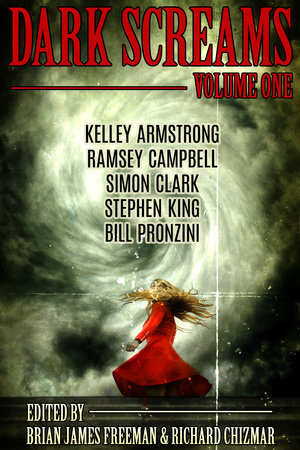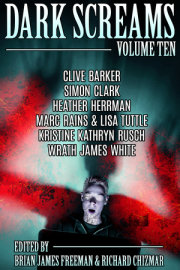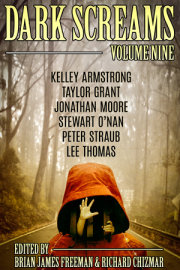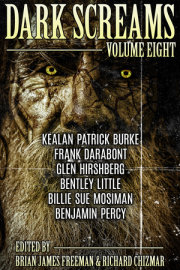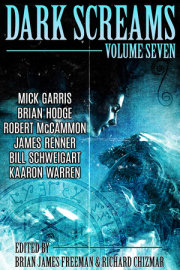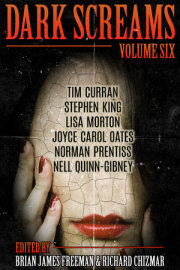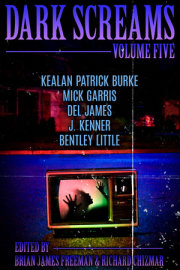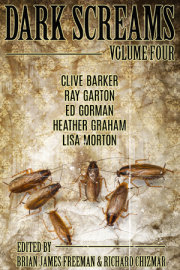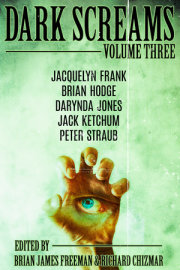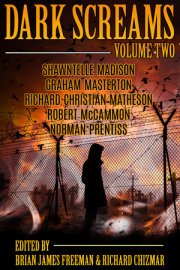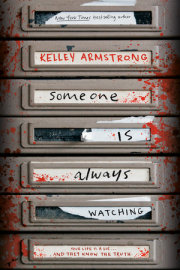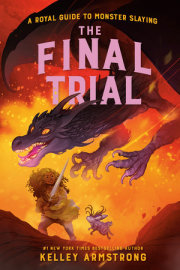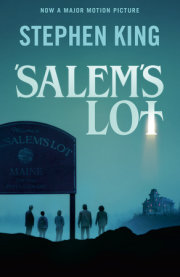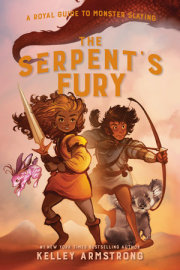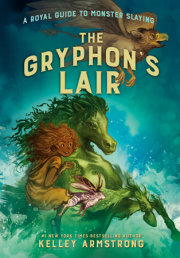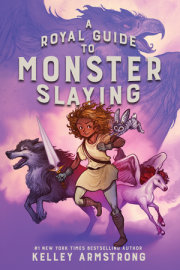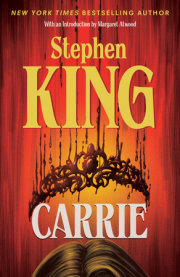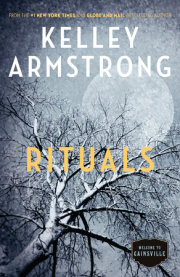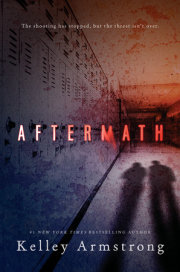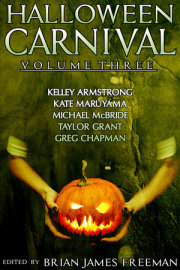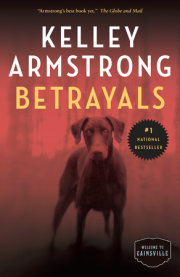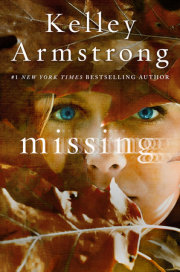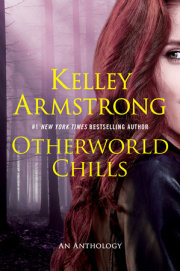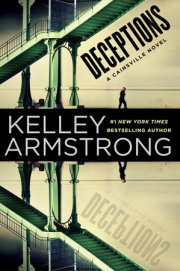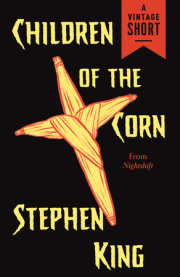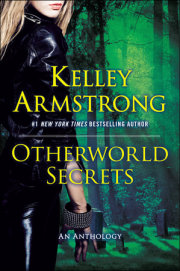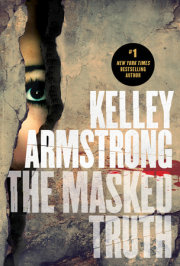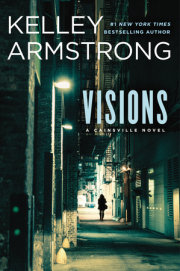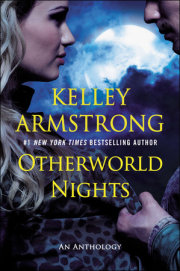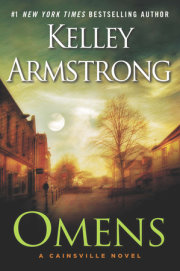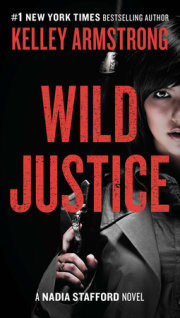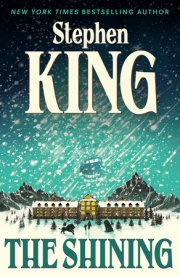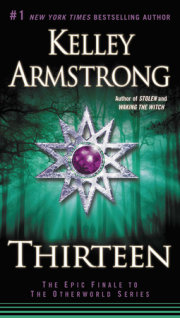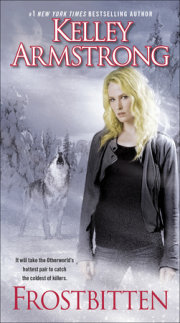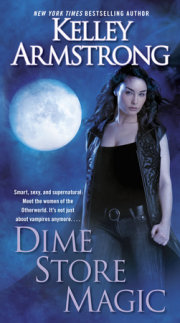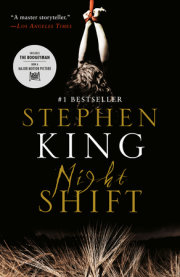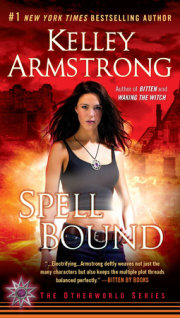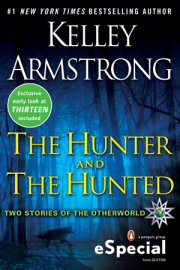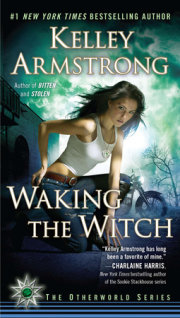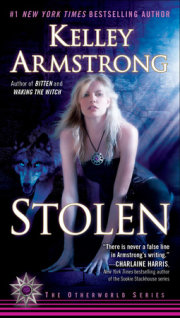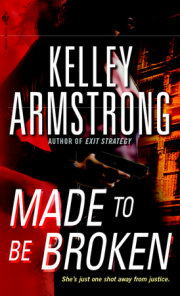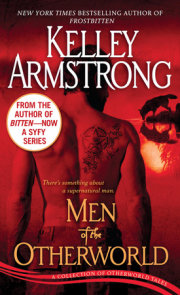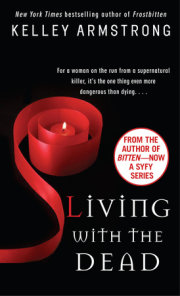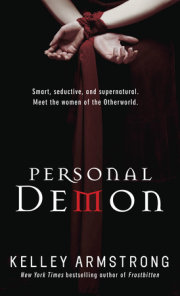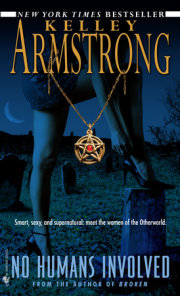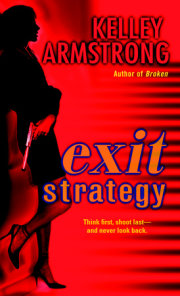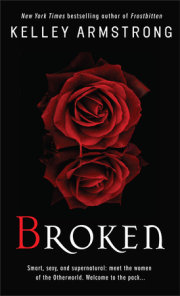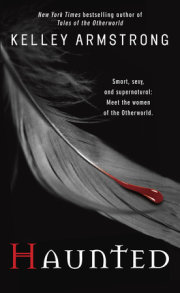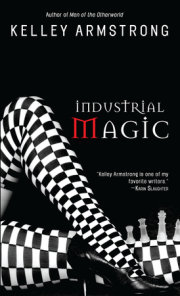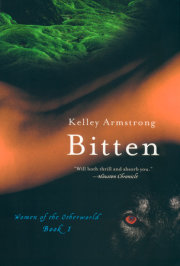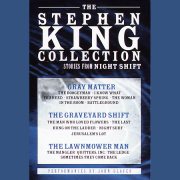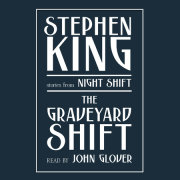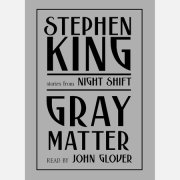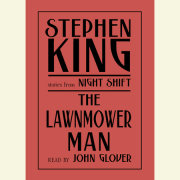Weeds
Stephen King
Jordy Verrill’s place was out on Bluebird Creek, and he was alone when the meteor traced low fire across the sky and hit on the creek’s east bank. It was twilight, the sky still light in the west, purple overhead, and dark in the east where Venus glowed in the sky like a two-penny sparkler. It was the Fourth of July, and Jordy had been planning to go into town for the real fireworks show when he finished splitting and banding this last smidge of sugar maple.
But the meteor was even better than the two-pound whizzers they set off at the end of the town show. It slashed across the sky in a sullen red splutter, the head afire. When it hit the ground he felt the thump in his feet. Jordy started toward Bluebird Creek on a dead run, knowing what it was immediately, even before the flash of white light from over the hill. A by-God meteor, and some of those fellows from the college might pay a good piece of change for it.
He paused at the top of the rise, his small house with its two outbuildings behind him and the meandering, sunset-colored course of the Bluebird ahead of him. And close to its bank, where the punkies and cattails grew in the soft marshy ground, earth had been flung back from a crater-shaped depression four feet across. The grass on the slope was afire.
Jordy whirled and ran back to his shed. He got a big bucket and an old broom. A faucet jutted out from the side of the shed at the end of a rusty pipe; the ground underneath was the only place grass would grow in Jordy’s dooryard, which was otherwise bald and littered with old auto parts.
He filled the bucket and ran back toward the creek, thinking it was good the twilight was so still. Otherwise he might have had bad trouble. Might even have had to call the volunteer fire department. But good luck came in batches. The fire was gaining slowly with no wind to help it. It moved out from the crater in a semicircle, drawing a crescent of black on the summer-green bank.
Moving slowly, with no wasted motion—he had fought grass fires before—Jordy dipped his broom in the water and beat the flames with it. He worked one end of the fire-front and then the other, narrowing the burn zone to twenty feet, ten, nothing. Panting a little, soot on his thin cheeks like beardshadow, he turned around and saw four or five burning circles that had been lit by sparks. He went to each and slapped them out with his wet broom.
Now for that meteor. He walked down to the crater, leather boots sending up little puffs of ash, and hunkered down. It was in there all right, and it was the size of a volleyball. It was glowing red-white-molten, and Jordy thanked his lucky stars that it had landed here, where it was marshy, and not in the middle of his hayfield.
He poked it with his boot, a roundish hunk of rock melted jagged in places by its superhot ride from the reaches of the universe all the way into Jordy Verrill’s New Hampshire farmstead on the Fourth of July.
He picked up his bucket again and doused the meteor with the water that remained. There was a baleful hiss and a cloud of steam. When it cleared away and Jordy saw what had happened, he dropped the bucket and slapped his forehead.
“There, you done it now, Jordy, you lunkhead.”
The meteor had broken neatly in two. And there was something inside.
Jordy bent forward. White stuff had fallen out of a central hollow, white flaky stuff that looked like Quaker Oats.
“Well, beat my ass,” Jordy muttered. He got down on his knees and poked at the white stuff.
“Yeee-ouch!”
He snatched his fingers away and sucked them, his eyes watering. He was going to have a crop of blisters, just as sure as shit grows under a privy.
A series of thunderclaps went off behind him and Jordy leaped to his feet, looking wildly at the sky. Then he relaxed. It was just the one-pound crackers they always started the fireworks show with. He hunkered down again, never minding the green starbursts spreading in the sky behind him. He had his own fireworks to worry about.
Jordy wasn’t bright; he had a potato face and large, blocky hands that were as apt to hoe up the carrots as the weeds that grew between them, and he got along as best he could. He fixed cars and sold wood and in the winter he drove Christmas trees down to Boston. Thinking was hard work for him. Thinking hurt, because there was a dead short somewhere inside, and keeping at it for long made him want to take a nap or beat his meat and forget the whole thing.
For Jordy there were three types of thinking: plain thinking, like what you were going to have for supper or the best way to pull a motor with his old and balky chain fall; work thinking; and Big Thinking. Big Thinking was like when all the cows died and he was trying to figure if Mr. Warren down at the bank would give him an extension on his loan. Like when you had to decide which bills to pay at the end of the month. Like what he was going to do about this meteor.
He decided the best way to start would be to have some pictures. He went back to the house, got his Kodak, went back to the creek, and took two flash photos of the thing, lying there cracked open like an egg with Quaker Oats coming out of it instead of yolk. It was still too hot to touch.
That was all right. He would just leave her lie. If he took it up to the college in a towsack, maybe they would say Jordy Verrill, look what you done, you f***in’ lunkhead. You picked her up and bust her all to hell. Yes, leave her lie, that was the ticket. It was on his land. If any of those college professors tried to take his meteor, he’d sic the county sheriff on them. If they wanted to cart it off and take pictures of it and measure it and feed little pieces of it to their guinea pigs, they’d have to pay him for the privilege.
“Twenty-five bucks or no meteor!” Jordy said. He stood to his full height. He listened. He shoved his chest up against the air. “You heard me! Twenty-five bucks! Cash on the nail!”
Huge, shattering thunderclaps in the sky.
He turned around. Lights glared in the sky over town, each one followed by a cannon report that echoed and vaulted off the hills. These were followed by sprays of iridescent color in fractured starburst patterns. It was the grand finale of the fireworks show, and the first time he’d missed seeing it on the town common, with a hot dog in one hand and a cone of spun sugar in the other, in more than fifteen years.
“It don’t matter!” Jordy shouted at the sky. “I got the biggest damn firework Cleaves Mills ever seen! And it’s on my land!”
Jordy went back to the house and was preparing to go into town when he remembered the drugstore would be closed because of the holiday. There was no way he could start getting his film developed until tomorrow. It seemed like there was nothing to do tonight but go to bed. That thought made him feel discontented and somehow sure that his luck hadn’t changed after all; the gods of chance had been amused to haul him up by the scruff of the neck and show him twenty-five dollars and had then jammed him right back down in the dirt. After all, Verrill luck was Verrill luck, and you spelled that B-A-D. It had always been that way, why should it change? Jordy decided to go back out and look at his meteor, half convinced that it had probably disappeared by now.
The meteor was still there, but the heat seemed to have turned the Quaker Oats stuff to a runny liquid that looked like flour paste with too much water added in. It was seeping into the ground, and it must have been some kind of hot, too, because steam was rising out of the burned crescent of ground beside the creek in little banners.
He decided to take the meteor halves back to the house after all, then changed his mind back again. He told himself he was afraid he’d break it into still more pieces, being as clumsy as he was, and he told himself that it might stay hot for a long time; it might melt right through whatever he put it in and put the house afire while he was sleeping. But that wasn’t it. The truth was that he just didn’t like it. Nasty goddamn thing, no telling where it had been or what that white stuff had been, that meteorshit inside it.
As Jordy pulled off his boots and got ready to go to bed, he winced at the pain in his fingers. They hurt like hell, and they had blistered up pretty much the way he had expected. Well, he wasn’t going to let this get away, that was all.
He’d take those pictures in to get developed tomorrow and then he’d think about who might know someone at the college. Mr. Warren the banker probably did, except he still owed Mr. Warren seven hundred dollars and he’d probably take anything Jordy made as payment on his bill. Well, somebody else, then. He’d think it over in the morning.
He unbuttoned his shirt, doing it with his left hand because his right was such a misery, and hung it up. He took off his pants and his thermal underwear, which he wore year-round, and then went into the bathroom and took the Corn Huskers Lotion out of the medicine cabinet. He spread some of the pearly-colored fluid on the blisters that had raised up on his right fingers and then turned out the lights and went to bed. He tossed and turned for a long time and when sleep finally did come, it was thin and uneasy.
He woke at dawn, feeling sick and feverish, his throat as dry as an old chip, his head throbbing. His eyes kept wanting to see two of everything.
“God almighty damn,” he muttered, and swung his feet over onto the floor. It felt like he had the grippe. Good thing he had plenty of Bacardi rum and Vicks ointment. He would smear his chest up with Vicks and put a rag around his throat and stay in. Watch TV and drink Bacardi and just sweat her out.
“That’s the ticket,” Jordy said. “That’s—”
He saw his fingers.
The next few minutes were hysteria, and he didn’t come back to his wits until he was downstairs with the phone in his hand, listening to that answering service tell him Doc Condon wouldn’t be back until tomorrow afternoon. He hung up numbly. He looked down at his fingers again.
Green stuff was growing out of them.
They didn’t hurt anymore; they itched. The blisters had broken in the night, leaving raw-looking depressions in the pads of his fingers, and there was this green stuff growing in there like moss. Fuzzy short tendrils, not pale green like grass when it first comes up, but a darker, more vigorous green.
It came from touching that meteor, he thought. “I wisht I never saw it,” he said. “I wish it come down on somebody else’s property.”
But wish in one hand, spit in the other, as his daddy would have said. Things were what they were, and he was just going to have to sit down and do some Big Thinking about it. He would—
God, he had been rubbing his eyes!
That was the first thing he did every morning when he woke up, rubbed the sleepy seeds out of his eyes. It was the first thing anybody did, as far as he knew. You wiped your left eye with your left hand and your right eye with . . . with . . .
Copyright © 2016 by “Weeds” by Stephen King. First published in Cavalier magazine, copyright © 1976 by Stephen King. All rights reserved. No part of this excerpt may be reproduced or reprinted without permission in writing from the publisher.

